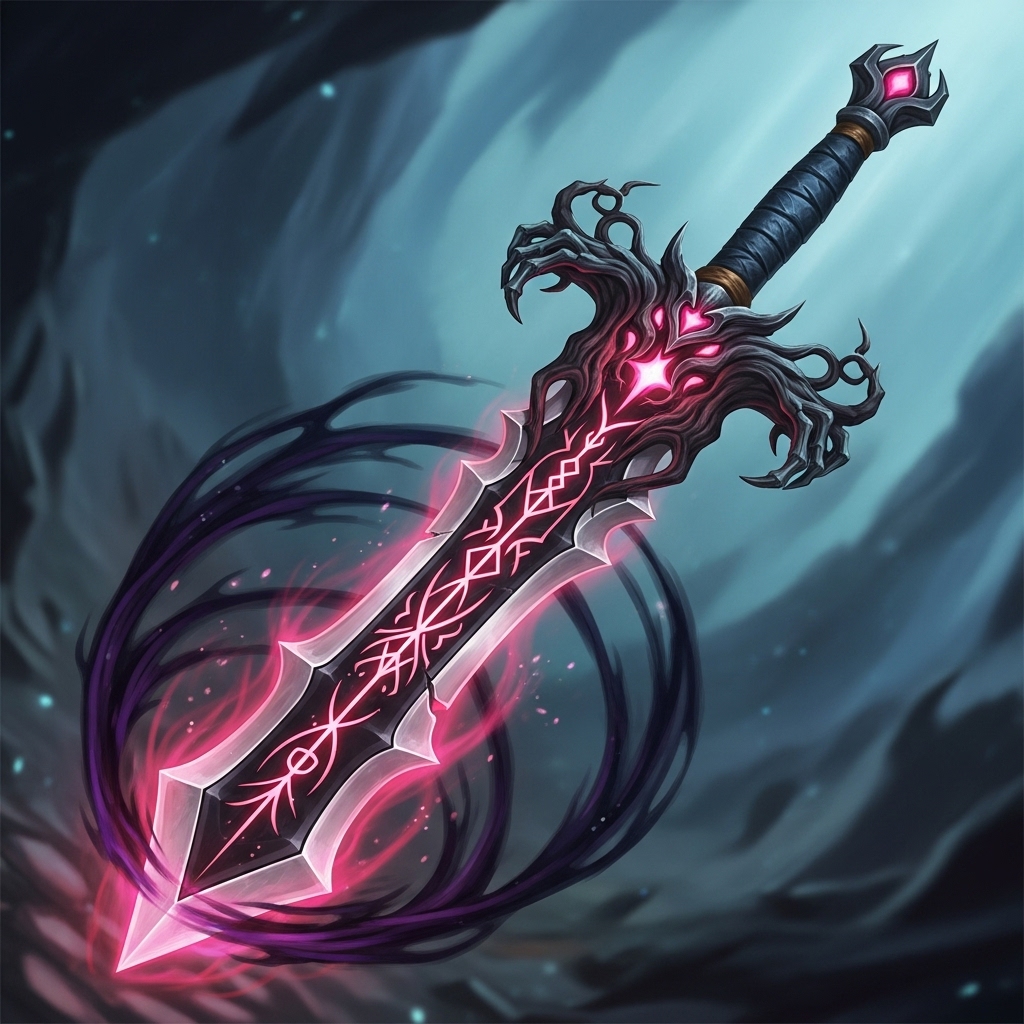Sword of Wounding

- Category: Weapon (Glaive, Greatsword, Longsword, Rapier, Scimitar, or Shortsword)
- Rarity: Rare (Requires Attunement)
When you hit a creature with an attack using this magic weapon, the target takes an extra 2d6 Necrotic damage and must succeed on a DC 15 Constitution saving throw or be unable to regain Hit Points for 1 hour. The target repeats the save at the end of each of its turns, ending the effect on itself on a success.
Tactical Applications
Persistent Damage: Provides ongoing wound damage that prevents healing and accumulates over time. Exceptional for damage dealers, anti-healing specialists, and characters requiring sustained damage output and healing prevention.
Class Synergies:
- Fighters: Perfect for weapon specialists wanting sustained damage and healing prevention
- Rangers: Essential for hunters needing persistent damage and anti-healing capabilities
- Rogues: Excellent for assassins requiring ongoing damage and healing disruption
- Damage Builds: Outstanding for characters prioritizing sustained damage output and healing prevention
Build Considerations: Requires attunement but provides ongoing damage enhancement with healing prevention. Most valuable for characters specializing in sustained combat and damage over time.
Acquisition Methods
Crafting Requirements: Requires wound magic, persistent enchantments, and damage essences. Creation cost 15,000-30,000 gp and takes 25 weeks.
Common Sources:
- Wound specialists and persistent damage enchanters
- Treasure hoards of legendary assassins and damage masters
- Commission from enchanters specializing in wound magic
- Found in the collections of damage researchers and wound specialists
- Sometimes discovered in torture chambers or obtained from wound creature encounters
Alternative Acquisition: Often found in locations with strong connections to persistent damage and wound magic themes.
Value & Trade
Estimated Value: 25,000-50,000 gp, with higher demand among damage specialists and anti-healing experts.
Trade Considerations: Popular among assassins and anyone requiring persistent damage and healing prevention capabilities.
Character Integration
Roleplay Elements: Suggests experience with wound magic, persistent damage, or professional roles requiring sustained damage and healing disruption expertise.
Character Concepts:
- Damage master with wound expertise and persistent damage experience
- Anti-healing specialist using wound magic for damage enhancement and healing prevention
- Character with extensive experience in sustained combat requiring persistent damage capabilities
- Wound specialist combining damage magic with traditional combat techniques
Adventure Hooks
The Healing Crisis: Anti-healing scenarios where wound magic provides crucial damage advantages and healing prevention.
The Persistent Quest: Damage adventures where wound control determines combat effectiveness and damage mastery.
The Wound Challenge: Combat situations where persistent magic enables sustained damage and healing disruption.
The Damage War: Wound conflicts where persistent control advances tactical positioning and damage dominance.
Variants & Customization
Greater Sword of Wounding (Legendary): Enhanced wound power and additional persistent abilities with improved damage capabilities.
Sword of Ultimate Wounds (Artifact): Includes comprehensive wound magic and ultimate persistent damage.
Assassin's Wounding Blade (Very Rare): Optimized for stealth combat with enhanced wound bonuses and damage features.
Specialized Variants:
- Torture Blade: Enhanced for interrogation with improved wound control and pain manipulation
- Hunter's Wounding Sword: Optimized for creature hunting with enhanced persistent damage and tracking wounds
- Executioner's Blade: Specialized for finishing moves with enhanced wound accumulation and damage finality
Lore & History
Origins: Created by wound masters who needed reliable persistent damage for their combat mastery and damage research.
Historical Significance: These swords enabled crucial damage victories and the mastery of wound techniques throughout combat history.
Cultural Impact: Represent the effectiveness of sustained damage and the power of persistent combat magic.
Magical Craft: Demonstrates understanding of wound magic and the complex processes required for persistent enhancement.
Balancing Notes
Introduction Timing: Appropriate for levels 8-16 when sustained damage becomes important and healing prevention provides significant advantages.
Campaign Impact: Provides powerful damage capabilities balanced by attunement requirement and wound focus.
Damage Focus: Most valuable in campaigns featuring sustained combat and healing-dependent encounters.
Encounter Design
Recommended Challenges:
- Sustained combat scenarios where wound damage enables superior damage effectiveness and persistent mastery
- Anti-healing encounters where wound abilities provide tactical advantages and healing disruption
- Damage challenges where persistent enhancement determines combat success and wound effectiveness
- Combat situations where wound magic advances objective completion and damage superiority
Wound Adjustments: Encounters may need to account for persistent damage accumulation and enhanced healing prevention.
Related Items
Damage Items: Other items that enhance persistent damage and provide wound capabilities.
Combat Equipment:
- Items that improve damage effectiveness and wound capabilities
- Equipment for persistent enhancement and damage mastery
- Tools for wound magic and damage development
Complementary Equipment: Items that enhance damage abilities or provide additional wound benefits.
Roleplay Opportunities
Damage Mastery: Characters develop expertise in wound techniques and persistent magic.
Combat Leadership: Damage capabilities create opportunities for leading sustained missions and wound operations.
Wound Excellence: Persistent magic enables impressive demonstrations of damage mastery and wound superiority.